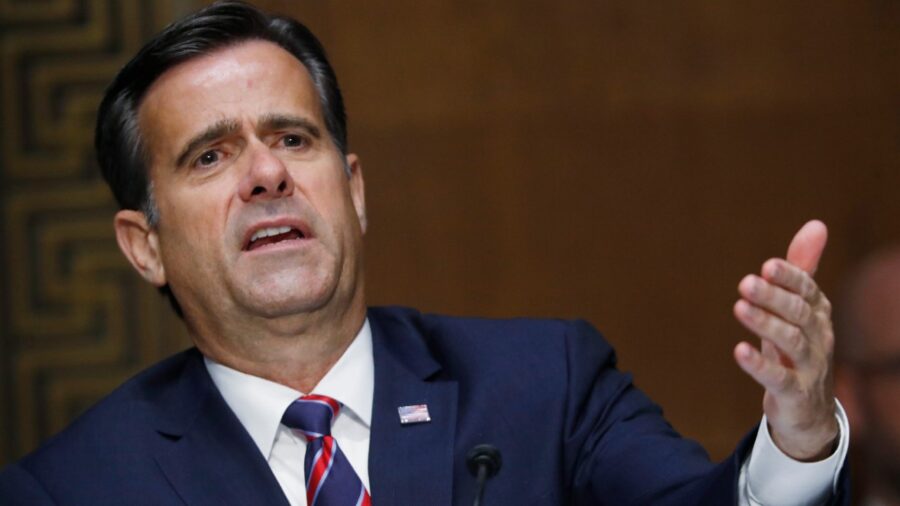Former Director of National Intelligence John Ratcliffe on Monday took issue with a remark by the White House press secretary, who said that the Biden administration’s approach to China would start out as one of “strategic patience” as it runs a series of interagency consultations and talks with allies before determining America’s posture going forward, with the former spy chief urging determined action on Beijing’s abuses, not foot-dragging.
Jen Psaki, the White House press secretary, said at a Jan. 25 press briefing that while the Biden administration recognizes the threats China poses to American security, prosperity, and values, and plans to hold Beijing accountable for its range of economic and trade abuses, she also stressed that the administration would start off with a patient round of consultations with domestic agencies and foreign allies before launching into action.
“We’re starting from an approach of patience as it relates to our relationship with China,” Psaki said. “So that means we’re going to have consultations with our allies, we’re going to have consultations with Democrats and Republicans, and we’re going to allow the interagency process to work its way through to review and assess how we should move forward with our relationship,” she added, stressing also that President Joe Biden would “take a multilateral approach to engaging with China.”
Ratcliffe reacted to Psaki’s remarks at the briefing, telling Fox News in an interview that the available intelligence speaks in favor of the view that the Trump administration’s tough-on-China policies should be continued without interruption.
“I can just tell you that what Jen Psaki said is entirely inconsistent with what the intelligence shows,” Ratcliffe said. “The intelligence doesn’t say we should have patience with respect to China, it says we should act with respect to China.”
“The policies that were based on that intelligence in the Trump administration should be followed,” he said, adding, “what I’m hearing are signs that maybe we will back off and we want better relations with China, and the path of appeasement is the road to nowhere when it comes to China.”

At Monday’s presser, Psaki was asked about comments made in a speech by Chinese leader Xi Jinping at the World Economic Forum that called for countries to “reject the outdated Cold War” mentality of confrontation with China and instead seek multilateral engagement, with Xi saying that nations must “avoid meddling in other countries’ internal affairs” and give priority to issues such as the pandemic recovery and climate change.
“To build small circles or start a new Cold War, to reject, threaten, or intimidate others; to willfully impose decoupling, supply disruption or sanctions; and to create isolation or estrangement will only push the world into division and even confrontation,” Xi said, likely referring to the policy of reshoring supply chains and other economic decoupling moves, along with tariffs, that were a feature of the Trump administration’s tough-on-China approach.
A reporter asked Psaki whether Xi’s statement would change the Biden administration’s stance toward China on trade and technology.
“No. I think our approach to China remains what it has been since—for the last months, if not longer,” Psaki replied.
“We’re in a serious competition with China. Strategic competition with China is a defining feature of the 21st century. China is engaged in conduct that it hurts American workers, blunts our technological edge, and threatens our alliances and our influence in international organizations,” she continued.
“What we’ve seen over the last few years is that China is growing more authoritarian at home and more assertive abroad. And Beijing is now challenging our security, prosperity, and values in significant ways that require a new U.S. approach,” she added.
Psaki then said that “we want to approach this with some strategic patience,” and predicate further action on both internal reviews and consultations with allies.
Asked about former President Donald Trump’s tariffs on hundreds of billions of dollars on Chinese goods, and whether Biden would keep them, Psaki said the policy would be evaluated and no decision has been taken yet.
“As is the case with other areas of our relationship with China, he will take a multilateral approach to engaging with China, and that includes evaluating the tariffs currently in place,” Psaki said, adding that “the president is committed to stopping China’s economic abuses on many fronts, and the most effective way to do that is through working in concert with our allies and partners.”
Psaki added that Biden’s view is that “we need to play a better defense, which must include holding China accountable for its unfair and illegal practices and making sure that American technologies aren’t facilitating China’s military buildup,” with the administration planning a “comprehensive strategy” to address these, and other China-related issues.
From The Epoch Times

